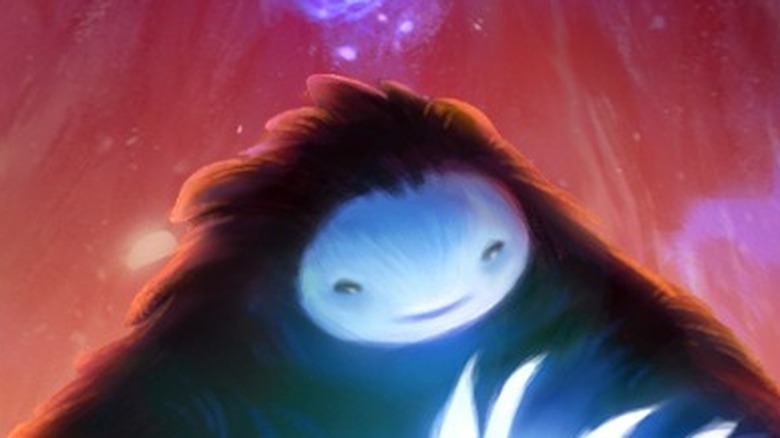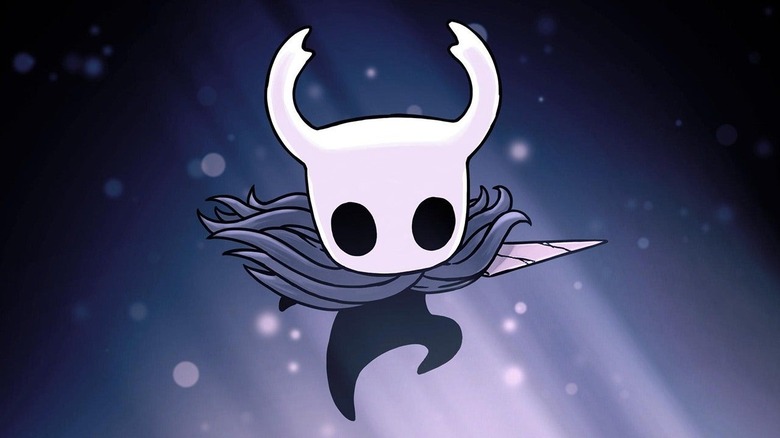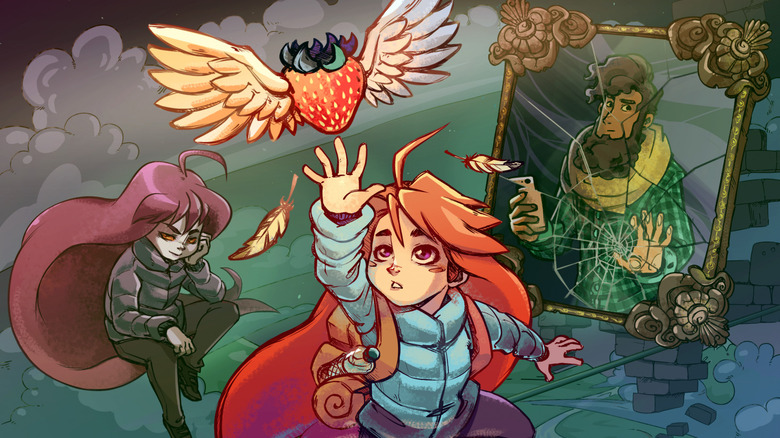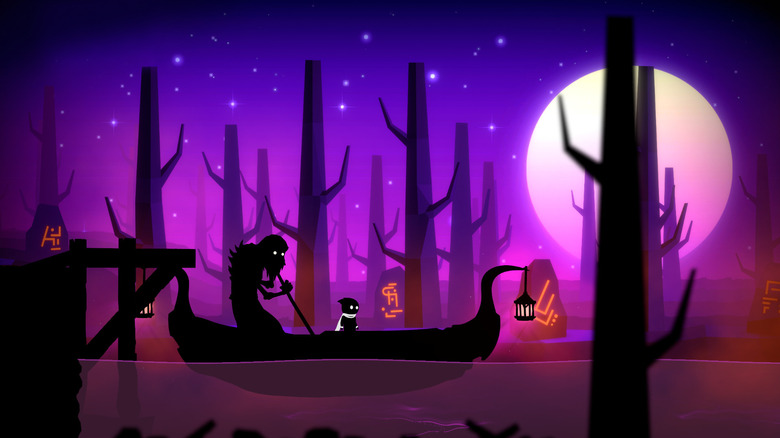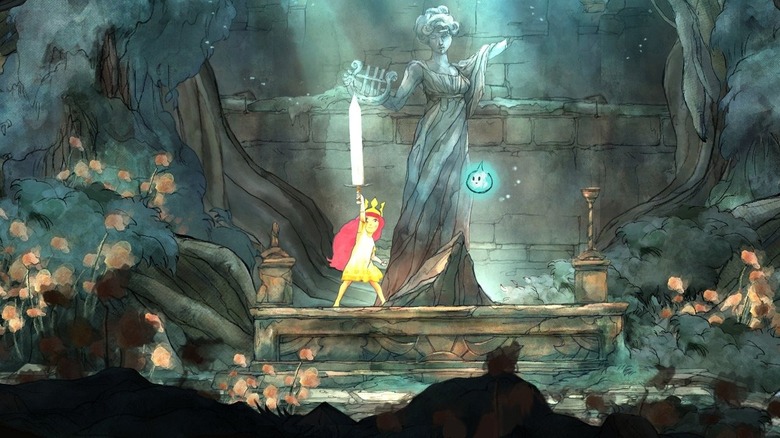Games Like Ori And The Blind Forest You Should Play
"Ori and the Blind Forest" chronicles the journey of the titular Ori, an orphan who uncovers his inner hero after disaster strikes his home. The action-platformer Metroidvania created by indie developer Moon Studios captured the hearts of players and critics following its 2015 launch, securing over 50 awards and nominations from sources like The Steam Awards, The Golden Joystick Awards, and BAFTA. Both the PC and Xbox One versions of the game earned an impressive 88 Metacritic score and, according to a GameSpot interview with developer Thomas Mahler, "Ori and the Blind Forest" turned a profit within one week of release.
Buoyed by success after success, publisher Xbox Games Studio greenlit a sequel with an expanded scope. Based on statements from executive producer Daniel Smith, players wanted a longer gameplay experience and Moon Studios was determined to deliver. "Ori and the Will of the Wisps" released in 2020 and quickly established itself as one of the best games of the year, even surpassing its predecessor's Metacritic scores on Xbox One and Series X and securing its status as a "must-play" title. Another stream of awards followed, further demonstrating that gamers cannot get enough of the storytelling, fine-tuned mechanics, and stunning visuals of the "Ori" franchise.
With only two entries in the series and the developers content with how they resolved the main character's narrative arc, fans have been forced to turn elsewhere to fill the Ori-shaped void in their lives. If you loved "Ori and the Blind Forest" and have already sampled the wonders of the follow up, here are the four games you should check out next.
Hollow Knight
Team Cherry's beloved 2D Metroidvania action-adventure "Hollow Knight" hit the scene in 2017 after blowing past its Kickstarter funding goal. Drawing inspiration from classics like "Metroid," "Mega Man," and "Zelda 2," "Hollow Knight" follows a genderless knight as they traverse an ancient, underground kingdom. They encounter a host of strange creatures and enemies along the way, fighting for their life and forging bonds as they unravel a long-forgotten mystery.
A skill and reflex-based game boasting a wealth of hand-drawn environments, "Hollow Knight" can take anywhere from 25 to 80 hours to complete, especially if you take the time to uncover all it has to offer. Much like both "Ori" titles, it maintains impressive Metacritic scores across all platforms. Critics and players highlighted its well thought-out abilities, difficult but rewarding combat, impressive story beats, and unique art style — categories that "Ori and the Blind Forest" also received high marks in.
Beyond the richly-detailed atmosphere, the wealth of content and emphasis on player freedom blew IGN's Tom Marks away. Based on his review, "Hollow Knight" always had another secret to uncover, with each new component seamlessly slotting in to the game's subtle narrative and expansive lore. Despite many of these details functioning as optional content, none of it felt like fluff intended to pad the playtime. For Marks, it all had a place in the world and story and he was compelled to track down every piece of the puzzle to assemble the full picture.
Celeste
"Celeste" manages to blend character-driven storytelling with accessible controls and challenging platforming mechanics, all while tackling the difficulties of living with and ultimately overcoming mental health issues. It also drew accolades and attention for featuring one of the few trans protagonists in the industry. Developer Maddy Thorson confirmed this popular fan theory nearly three years after the title released, revealing that they had begun to uncover and come to terms with their own trans identity during the development cycle.
In many ways, "Celeste" centers on the concept of finding hidden strengths. "Celeste is one of those rare games where I knew it was special right off the bat," wrote Destructoid's Kevin Mersereau. Despite the spartan controls, "Celeste" never stops challenging the player, leading Mersereau to highlight the revolving environment-based mechanics and constantly rising difficulty. He further appreciated the title's accessibility options, which allow individuals of all skill levels to progress through the game. The addition of hardcore "B sides" for every level, leaderboards, collectibles, and opt-in timers also make it a speedrunners' dream. Blown away by these details, along with the themes and narrative, Mersereau concluded his review with the declaration that "[Celeste] sets a new standard for what I'd define as a modern 'classic.'"
If you've ever struggled with depression, anxiety, self-worth, or even your identity, "Celeste" could be the game you didn't know you were waiting for. "In Celeste, we try to gently push the player to do things that they thought [were] impossible for them," Thorson told Vice in 2018. "We want people to come out of this game feeling capable and powerful, so that means we have to teach them, challenge them, and support them through the failures."
Eternal Hope
"Eternal Hope" centers on the travails of Ti'bi, a boy who enters the "purgatory-like" Shadow Realm to recover his deceased girlfriend's soul and bring her back to life. During his quest, Ti'bi gains the ability to move between dimensions, a mechanic that plays a key role as he overcomes the challenges of each environment and uncovers the secrets of the underworld. From forests and caves to cities, "Eternal Hope" boasts a diverse range of landscapes inhabited by unique beings and species.
Though "Eternal Hope" did not garner as much attention as indie darlings such as "Hollow Knight" or "Celeste," it secured a "Very Positive" rating on Steam following its summer 2020 launch. Reviewers were smitten with its short but sweet story, stunning visuals, atmospheric sound design, and dimension shift gimmick, though the controls and lack of key binds marred the experience for many.
Critics proved somewhat less enthusiastic about "Eternal Hope," though the puzzle platformer still managed to secure a solid Metacritic score of 70. Screen Rant's Cody Peterson highlighted its Studio Ghibli inspirations before drawing parallels to "Hollow Knight" and "Limbo." Despite these similarities, Peterson felt "Eternal Hope" has something special to offer to the genre, with the dimension shift mechanic and satisfying narrative acting as the key standouts. "Eternal Hope is a wonderful indie title that players will find themselves thinking about for days after they finish it," asserted Peterson.
If you've got ten bucks and 2-4 hours to spare, "Eternal Hope" might be worth picking up.
Child of Light
RPG platformer "Child of Light" places players in the role of Aurora, a pure-hearted princess who must save the Kingdom of Lemuria from the Black Queen. To accomplish this monumental task, Aurora sets out to recover the three light sources — the Sun, the Moon, and the Stars — stolen by her wicked foe. Developed by Ubisoft Montréal, "Child of Light" captures the magic and wonder of classic fairytales, complete with mythical locations and creatures that would be right at home in a storybook.
Released on several platforms, "Child of Light" earned Metacritic scores ranging from 74 on Xbox 360 up to 89 on PlayStation 3. IGN's Vince Ingenito applauded the developers for creating such a cohesive whole, complete with hand-painted art, appealing characters, and trope-defying story and gameplay choices. "Elegance," began Ingenito's review. "It's a word I've rarely found applicable where video games are concerned, but there's no better way to describe what Ubisoft has achieved with Child of Light."
Though "Child of Light" leans more heavily on its RPG roots, it offers a seamless blend of the elements that caused many players to fall in love with "Ori and the Blind Forest." Much like Ori, Aurora starts out small and afraid and must unlock hidden reserves of courage to deliver the Kingdom of Lemuria from certain destruction. It shines both in and out of combat, often eschewing convention to create a persona uniquely its own. "The net result is an experience that feels less like a power fantasy, and more like the cherished memory of a childhood bedtime story," observed Ingenito.

